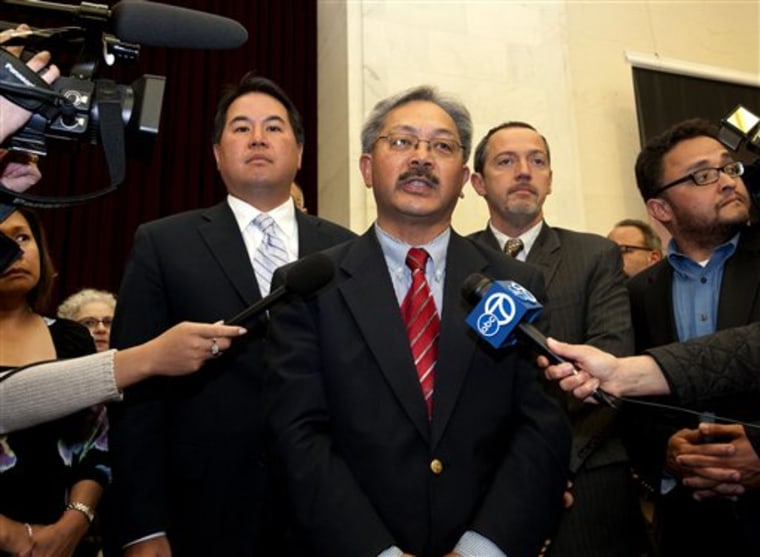Already home to the nation's oldest Chinatown and the largest Asian population in the continental United States, San Francisco is poised to welcome its first Asian-American mayor.
The outgoing Board of Supervisors on Friday voted 10-1 to appoint City Administrator Edwin Lee as interim mayor to serve until the November mayoral election.
To make the appointment official, Lee also must be approved by the new board of supervisors when it convenes for the first time Tuesday — a hurdle he is expected to clear with ease if the seven carry-over members don't change their votes.
The 58-year-old Chinese-American would govern a population of more than 815,000 residents that is 34 percent Asian, making San Francisco the largest U.S. city with an Asian-American mayor, said Don Nakanishi, director emeritus of the UCLA Asian Studies Center.
"Big-city mayors are a category that has been really lacking in Asian-American representation in comparison to other political positions," Nakanishi said. "San Francisco is a very recognizable city in terms of stature and importance to the state and nation, so that would be a significant accomplishment."
Lee wouldn't be the Bay area's only political "first" of the new year: on Jan. 3, neighboring Oakland inaugurated Mayor Jean Quan, the first Asian-American woman to lead a major U.S. city.
Elsewhere in the state, 10 other mayors, three members of Congress, eight members of the state Legislature and two statewide officeholders are of Asian or Pacific Islander descent, according to the Asian Pacific American Institute for Congressional Studies in Washington, D.C.
Those numbers would have been unheard of even a decade ago, said Gene Kim, the institute's communications director.
"Historically, our community hasn't been as politically active, due to socioeconomic barriers and a lack of a lot of real role models," he said.
The APAICS has been closely watching the negotiations in San Francisco, Kim said, and the rise of an Asian-American mayor in the city is seen as "long overdue."
"The Chinese community in San Francisco has never had this opportunity before," Supervisor John Avalos said before casting his vote for Lee on Friday, an event that drew dozens of Asian-Americans to City Hall. "It's very, very meaningful."
Lee has so far denied any mayoral aspirations beyond the interim term. But city Assessor-Recorder Phil Ting and state Sen. Leland Yee, a San Francisco Democrat, already have announced their candidacies for the fall race, and Supervisor David Chiu is said to be considering a run as well.
"The fact that there could be multiple Asian-American candidates to choose from — and the strength of those candidates — indicates how far we've come," Kim said.
Nationwide, the Asian population is expected to increase from the current 5 percent to 8 percent by 2050, the U.S. Census Bureau estimates.
The success of Asian-American candidates in states as geographically diverse as South Carolina, Minnesota and Idaho, as well as the increasing prominence of their offices, represents a dramatic shift, experts say.
Yet Asian-Americans still hold a disproportionate share of elected positions, and the pace of change has been steady but relatively slow. Out of the 435 members of the newly elected House of Representatives, only nine are Asian-American or Pacific Islander, according to the APAICS.
In California, the Asian-American community represents 14 percent of the population but just 8 or 9 percent of the electorate, Nakanishi said.
"We're still not quite there because such a large number of people are not yet naturalized and are still seeking citizenship," he said. "But there's no question that with every election, more and more Asian-Americans are registering to vote and voting. And I think the California political scene will soon begin to reflect the ethnic diversity of the state."
Ethnic media also are covering political campaigns more extensively and working to educate the electorate, Kim said.
"Calling attention to these races and politicians helps erase the internal notion that we're not viable candidates," he said. "It changes people's perspectives within the (Asian-American) community, but it also shows how active and involved we are in the fabric of the United States."
